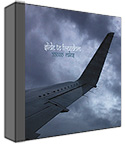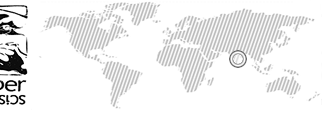|
|
 |
Bio
|
More About Slide to Freedom
|
A son of the northern prairie devoted to the swampiest of southern blues befriends the Eddie Van Halen of Indian Classical music. They hold a meeting of musical minds using some of the world’s most wildly inventive lap slide instruments. The result: Juno Nominated (Canada's Grammy Awards – World Music Album of the Year) Slide to Freedom 2: Make a Better World, an intuitive exploration of the unexpected place where the sonic passions of slide guitar and dobro master Doug Cox and Indian classical slide icon Salil Bhatt come together.
It’s a collaboration that goes far beyond the obvious “Indian meets blues;” it’s an improvised road trip across the terra incognita of the planet’s slide instruments. “People often think of slide instruments like the dobro as hokey American folk instruments, the kind of thing you play while sitting on a haybale,” Cox smiles, “but slide developed all over the world, from the United States to India, though it has a North American reputation. If you look at most folk musics, there usually is some kind of slide involved.”
India may in fact rival North America in its devotion to and creative license with lap-style slide instruments. Salil Bhatt hails from a long line of sitar and veena masters and innovators, most notably his father and fellow collaborator on Slide to Freedom 2, Vishwa Mohan Bhatt, one of Ravi Shankar’s oldest sitar disciples and an old buddy of George Harrison. The late Beatle is honored on “For You Blue,” where Vishwa takes a wild and eerie solo.
But the Bhatts’ true love is the slide, and they have both come up with new hybrid takes on the traditional Indian veena, a large and complex lute with two resonators. In the Bhatts’ hands, this mainstay of Indian classical music has collided with an arch-top guitar, all while retaining the sympathetic drone strings of a sitar, the plucked drone string of a banjo, and the lap playing style of the blues.
And Cox isn’t your average Canadian bluesman/folkie, either. Fascinated by the Indian slide, he made contact with Salil online right before Salil was heading to Canada for a tour. The tour hit a snag, and Cox arranged some concerts for Salil, Pandit Vishwa Mohan Bhatt and tabla player Ramkumar Mishra. Cox asked if he could spend a week studying with them. The Bhatts refused, but instead suggested they make an album together.
As they began experimenting, Cox realized that his usual standbys—the bottleneck slide guitar he’d first picked up playing with Canadian & British blues greats like Ken Hamm and Long John Baldry or the often haunting dobro he’d played with dozens of folk and bluegrass acts—just weren’t the best fit sonically for what Salil and company were playing.
So Cox picked up his Gadgie, a rare type of metal-bodied resophonic guitar created by an eccentric instrument builder in Northern England. It tuned to just the right resonant spot to match the veenas and blended perfectly with Bhatt’s sound, which is filled with the hard-core, rebellious drive of a rock guitarist. “I get the feeling that most people can’t tell exactly who’s doing what, and that’s a good thing,” Cox notes.
The blend of sounds was echoed by an evolving blend of approaches, with Cox bringing beloved blues tunes like the New Orleans classic “Make a Better World” to the table, and Salil contributing ragas and melodic lines that sparked instrumental improvisations like “The Moods of Madhuvanti” and “Blessings.” Using what Cox calls an “intuitive, instinctual approach,” usually captured in a single take, they discovered a deep spontaneity where their traditions met, despite some surprising challenges.
The musicians were intrigued as they exposed the juxtapositions of the blues emphasis on chord progressions with Indian music’s scales. The rhythmic tendency in blues to play a hair behind the beat was a sharp contrast to the Indian classical emphasis on the tala that forms the firm rhythmic basis for any Carnatic piece.
“There were times when we were showing each other phrases, and it was surprisingly hard. They were very, very patient in showing me the ragas and all their amazing subtleties. I always thought they were about microtones, but they’re about a lot more,” Cox recalls. “Once, I remember, after what felt like two hours, I got the line they were teaching me, and I was trying to show them a blues lick, a three-note phrase but with blues timing. It was about playing behind the beat and where you placed the phrase. The difference in rhythmic perspective was fascinating and challenging.”
After an album and two tours with Cox, Salil and Mishra, who became an expert at the tabla blues shuffle—got a real feel for the blues, thanks in part to the input and insight of New Orleans gospel tenor John Boutté, who joined Cox and the Indian trio on Slide to Freedom 2. Boutté’s powerful voice can move from sweet silk to Delta grit in the space of a phrase and added a whole new dimension to Cox and Bhatt’s work together.
At the suggestion of NorthernBlues' label head Fred Litwin, Cox decided they should tackle gospel standard, “Amazing Grace,” though he hesitated at first. That is, until Boutté began to tell the story behind the hymn, how it was written by 18th-century British slave trader John Newton, whose religious revelation caused him to demand humane treatment of his human cargo and eventually condemn human trafficking. Boutté’s words proved revelatory for Salil and Vishwa: “They had never heard an African-American talking about the experience of slavery,” Cox muses. “We were all so moved that when we sat down to record the track, it became this otherworldly music. They just got it.”
For Cox, this was more than a great moment leading to a great track; it’s a symbol of the future of folk. “As a musician, I feel that the future of traditional music really lies in the coming together of cultures. Folk music until now came from isolated cultures developing their own unique style of music. That’s not going to happen anymore,” Cox explains. “Instead, traditional artists will expose each other to sounds from other places and create something new together. There may be wariness on both sides, I’ve learned, but there is also profound understanding.”
Slide to Freedom's newest member, Cassius Khan, replaces Ramkumar Mishra on tablas, who has decided to take a break from touring too far from his home in India. Cassius is the only known Indian Classical musician in the world who has combined Tabla playing and Indian Ghazal singing simultaneously, thus a remarkable feat in the Indian Classical music scene. His first appearance with Slide To freedom was at 2009's Stan Rogers Folk Festival in Canso, Nova Scotia. Cassius Khan is featured on Ellen McIlwaine’s recent release “Mystic Bridge” (2006), on Stu Goldberg’s “Dark Clouds” (2006) album, two of Dave Martone’s albums, “A Demon’s Dream” (2004) and “The Alchemists”
(2004), and recently on ROAM’s new album, “Baby Steps” (2008). When not touring, Khan has students around the world who learn Ghazal singing and Tabla playing from him. He is married to Kathak Dancer/ Harmonium player Amika Kushwaha. They reside in Vancouver. Cassius has a new CD out called Mushtari. The CD features Cassius Khan in his element singing Ghazals and playing a tabla solo recital. |
|
 |
|
|
|



